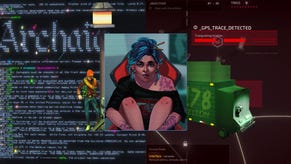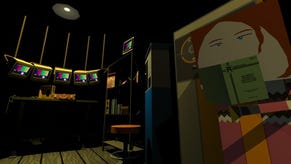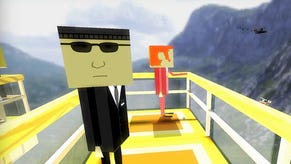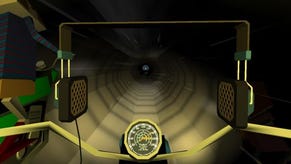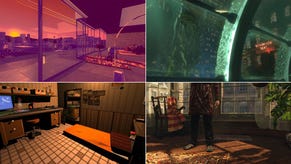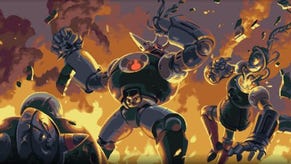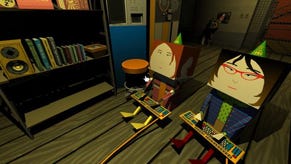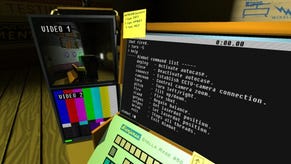Blendo On Quadrilateral Cowboy, Experimental Games
He's Probably Hacking
"Twentieth Century Cyberpunk." That's Quadrilateral Cowboy's elevator pitch, but "hacking that's not just some awful minigame" would work just as well. I played Blendo's latest during PAX, and my heart grew three sizes that day. Also, my brain turned into a copy of William Gibson's "Neuromancer." I quite like it, is what I'm saying. Afterward, I sat down stood in a deafeningly loud convention center corner with dev dynamo Brendon Chung, and we discussed Quadrilateral Cowboy, Thirty Flights Of Loving, how to tell a good game story, and the difficulties of integrating such things into, well, games. It's all after the break.
RPS: So this takes place in the same continuity as all your other games, right? Why take a sudden turn into cyberpunk, hacking, and stuff like that?
Chung: Yeah, I try to place all my games in the same universe. So Gravity Bone, Thirty Flights Of Loving, Flotilla, Atom Zombie Smasher, Air Forte - they're all in the same timeline.
As for why I chose to make Quadrilateral Cowboy, a lot of games have hacking minigames where you match colors together or whatever. But I've always wanted to just type commands into a terminal. That's a very risky and niche design choice, so it's understandable why people don't do that. But I figured that I can do what I want, so I might as well give it a shot.
Second reason is that I felt like there hasn't really been a game that really, really deep dives into pure cyberpunk. I mean, you have Deus Ex with really strong cyberpunk themes and tones, but I wanted to make a game based completely on cyberpunk [activities].
RPS: I was pleasantly surprised by how quickly I picked it up. I mean, I can't code. Math books snarl aggressively when I'm nearby and attempt to assault me with vicious series of paper cuts.
Chung: For me, I'm a self-taught programmer. I never really had any formal training. So I think that learning programming is not something only certain people can do. I think it's something that anyone can do. You just need to present it to them in a clear and concise way.
RPS: So how close to actual programming language and methods would you say Quadrilateral Cowboy gets?
Chung: I grew up using DOS, so it's kinda a mish-mash of programming languages. So it'll give you some elements from programming. It won't make you a programming genius, but it'll give you some fundamental stuff.
RPS: I heard the phrase "Guitar Hero of programming" thrown around.
Chung: Yeah, I have a brother, and I described this game to him. And he said, "Oh, so it's like Guitar Hero, but with typing on a keyboard." And I said, "Yeaaah."
RPS: Are you planning to have any consequences for failure beyond briefly triggering alarms, walking into lasers, or things of that nature? Are actual enemies or crazy chase scenes or anything like that in the cards?
Chung: So the fiction is that you are hired by corporations to make plans to infiltrate buildings and steal documents. But you're not the one actually running the plans. You're just making them and giving them to people who are way more athletic than you are. So the idea is that you're just a guy sitting in a chair wearing VR goggles.
RPS: Kind of like Neuromancer.
Chung: Totally like Neuromancer! So the penalties are, you know, like a beeping noise. You can't really die or anything like that.
I'm still working [on NPCs]. I mean, I'm kind of scared about doing NPCs - especially in a first-person shooter [style setting]. You have a lot of AI work and collision work going. But the good news is that I'm using the Doom 3 engine, and it already has a lot of that stuff in there. So I just need to figure it out.
RPS: Doom 3 went open source pretty recently. Are you generally a supporter of open source engines?
Chung: Exactly. For other games, I used Quake 2, and now I'm using Doom 3, because there's something I find very helpful about using engines that are completely open source. I have complete control over every single detail.
RPS: I can't actually think of many professional projects that have used Doom 3 since it went open source, actually.
Chung: Yeah, I agree. It's kind of surprising to see, actually.
RPS: That's pretty unfortunate. If more people used them, you'd figure that more people would release them.
Chung: Definitely.
RPS: How much complexity are you shooting for with the puzzles? I mean, most of what I played was about teaching me the basics. Once I have those down, though, will I be, like, jamming out a hundred lines of code right and left?
Chung: [laughs] I mean, yeah, it's a tough line to define. You want it to be challenging enough that it's fun, but you don't want it to be so tough that it's tedious or feels like a job. It's something I'm still trying to figure out.
RPS: Are you hoping to include any wild Gravity Bone or Thirty Flights Of Loving-style story flourishes in this one?
Chung: This is kind of a departure from Thirty Flights Of Loving and Gravity Bone. Those are narrative experiments. This is not a narrative experiment. It's more just trying to make a game based on systems. It's kind of the opposite of Thirty Flights and Gravity Bone.
But as for the story, I do think story's a very important element of what I try to do. So for this one, I'm playing with the idea of adding some roguelike elements. So multiple missions take place in the same environment, but then the objectives are kind of randomized. So the objective might be in this room or that room, and the player might be here, there, or there. But we'll see how that works out. It's kind of overambitious, so we'll see.
RPS: How are you going to convey the plot of this one. Will it mostly be environmental cues that the player has to seek out?
Chung: I try to avoid text and dialog in my games. The plan is to try to include story stuff integrated into the environment if possible.
RPS: So Quadrilateral is a pure "game," and Thirty Flights and Gravity Bone are pure narrative experiments. Meanwhile, people criticize those two precisely because they're not very game-y. Have you considered adding those types of story elements to something like Quadrilateral? Is that even possible?
Chung: Yeah. I mean, a lot of the feedback I get is that Gravity Bone is way better than Thirty Flights Of Loving because you have platforming and they use weapons and there's objectives! That's fine. I think that's perfectly valid. But I think people look for different things in games. I made Thirty Flights Of Loving for a certain audience that just likes the story bits and doesn't want to play the challenging game-y bits.
RPS: Have you given any thought as to how you'd fit those puzzle pieces together - how you'd integrate an experimental story such that it's not at odds with everything else, ala Gravity Bone's less-than-great platforming?
Chung: Ummm. I have not, because that is a hard problem [laughs]. But I mean, sure, I've thought about it, but I haven't really chanced upon anything worth talking about.
RPS: I want to play more Quadrilateral Cowboy. My philosophically questionable cybersoul yearns for it. When can I do that?
Chung: We'll see. I just release games when I feel like they're finished. So maybe this year? Probably next year. I don't know [just yet].
RPS: Thank you for your time.





